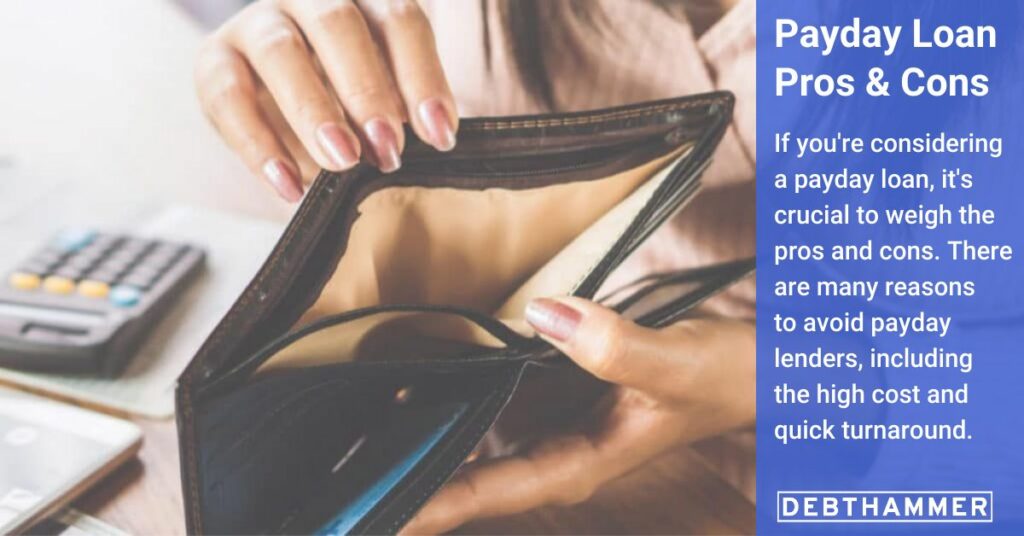If you make less than $40,000 a year, don’t have a college degree, have questionable credit, don’t own a home and are divorced or separated, you’re a payday lender’s prime target.
But though they seem like a fast and simple option, that two-week payday loan can have a long-term impact on your financial situation. Before you talk to a payday lender, it’s important to understand the loans’ benefits and drawbacks.
Table of Contents
Our take
- Payday loans have only a couple of advantages — speed and minimal qualifications
- There are quite a few disadvantages, including cost, risk of long-term financial damage and they don’t help you build or repair credit
- Payday lenders target borrowers with low incomes and poor credit scores
- Payday lenders charge crushing interest rates of 300% APR — or even higher
- They’re dangerous because they leave borrowers trapped in a cycle of debt
- Payday loans are so predatory that they are illegal in several states
Stuck in payday debt?
DebtHammer may be able to help.
At a glance: Payday loan pros and cons
| Pros | Cons |
| Speed | They’re expensive |
| Convenience | They’re dangerous |
| No minimum credit score requirement | They target low-income and minority populations |
| No collateral required | Payday lenders are predatory |
| Minimal qualifications | You’ll have to provide access to your bank account |
| There are a lot of scams | |
| You could get sued | |
| You’ll likely get stuck in the payday loan debt cycle | |
| They won’t help you build credit |
Payday loan pros
There are definitely more drawbacks than advantages when it comes to payday loans, but there are a few benefits:
They’re quick and easy
These loans are quick, easy, flexible, convenient, invaluable for emergencies, use the money for anything, and usually do not require a credit check. All you need is an ID and a bank account.
There’s no credit check
Payday loan lenders won’t check your credit reports with the three major credit bureaus (Experian, Equifax, TransUnion), so you’ll still qualify even if you have bad credit or your credit score is less than perfect. They also don’t report your loan to the major credit bureaus if you repay the loan on time and in full, so they won’t help you improve your credit score.
Pro tip: Payday lenders report to minor credit bureaus like FactorTrust and Clarity, so there will still be a record of your loan, and lenders will know if you already have a payday loan or have defaulted on a loan.
READ MORE: How long does a payday loan stay in the system?
They’re easy to access
When you’re in a bind and need quick financial relief, it is easy to stop by any of the 23,000 payday lenders in the U.S.; that’s more than the number of McDonald’s and Starbucks. Most offer same-day funding until 2 p.m. local time. Otherwise the money is available on the next business day.
They’re unsecured loans
Payday loans are considered a form of unsecured debt, which means you do not have to give the lender any collateral or put anything up in return, like if you went to a pawn shop.
READ MORE: Is a payday loan secured or unsecured?
Qualification requirements are minimal
Borrowing from payday lenders is less rigorous than lending from traditional sources like a bank or credit union. The underwriting requirements are minimal and approval is fast.
Its basic requirements are:
- Be at least 18
- Have a government-issued ID or Social Security number
- Have a steady job or another source of income
- Have a checking account
READ MORE: Payday loan requirements
Cons of payday loans
Though payday loans admittedly have a couple of benefits, their disadvantages outweigh their advantages.
They’re expensive
Payday loans are notorious for sky-high fees and interest rates. Repayment on the next payday makes it almost impossible to come up with enough money to repay the total amount of the loan in a lump sum, leaving you stuck in a debt cycle that can take months to escape.
A typical two-week payday loan with a $15 per $100 fee equates to an annual percentage rate (APR) of almost 400%. APRs on credit cards range from about 12% to about 30%.
READ MORE: Payday loan interest rates
They’re dangerous
Payday loans are low-limit, short-term loans with high interest rates meant to be repaid from your next paycheck. Annual percentage rates are often in the triple digits, sometimes higher than 600% APR. Loan amounts are small, generally less than $500. But it’s very difficult to repay $500 on your next payday, which means borrowers are forced to roll over their loan and pay even more fees. They end up trapped in an endless cycle of debt.
A 2021 DebtHammer survey found that more than 90% of payday loan borrowers regret taking out their original loan. Payday loans are so dangerous that they’re illegal in several states.
Payday loan lenders target low-income, minority communities
According to a report from the Center for Responsible Lending, there are about 8.1 payday loan stores per 100,000 people in Black and Latino communities. Mostly white neighborhoods had about four payday loan storefronts for every 100,000 people.
These communities are targeted because these low-income, minority communities have more residents who make less than $40,000 a year, don’t have a college degree, and more than likely don’t own a home.
According to Bloomberg.com, payday lenders made record profits during the 2020 COVID-19 pandemic by targeting Black and Latino communities.
Payday lenders are predatory
Predatory lending is any lending practice that imposes unfair and abusive loan terms on borrowers. Predatory lenders use high-pressure tactics and deception to persuade borrowers to take out loans they can’t afford. And it’s even worse if you end up saddled with a tribal payday loan. Tribal lenders have figured out how to skirt state laws, so they charge insanely high interest rates, even in states where payday loan interest rates are capped.
You’ll have to provide access to your bank account
Payday lenders demand access to your bank account to verify your income, set up payments, and deposit funds.
Online lenders ask for a routing and account number, while brick-and-mortar lenders ask for a voided check containing your routing and account number. Other lenders require you to give them a postdated check for the full loan amount, which can be cashed on your next payday – whether or not the money is in your account.
But regardless of how they ask you to provide the information, giving a payday lender this level of access to your bank account should be enough to make anyone uncomfortable.
Pro tip: If you can’t afford to repay the loan, it’s possible to stop these ACH payments from being debited from your account, but it requires some specific actions.
You could get scammed
Scammers are everywhere, including the payday loan industry. To avoid potential scams, never provide information if the company asks for your login credentials over the phone. If the site login page is not secure and your browser gives you a notification, choose a different lender. And if a company says you need to pay a fee before you apply, that’s a red flag.
The federal Truth in Lending Act requires that payday lenders disclose all fees and added costs to borrowers. Carefully review this paperwork before you sign a loan contract. If the lender refuses to provide the information, there’s a good chance you’re being scammed.
READ MORE: How to protect yourself from payday loan scams
You could end up in court and have your wages garnished
If you decide not to pay your loan and are taken to court by the lender, and you lose, your employer can withhold the legally required portion of your wages to service your debt — whether or not you can afford it.
They could leave you stuck in a cycle of debt
Payday lenders use payday loans to exploit financial needs by trapping you in a debt cycle with high interest rates, also known as the payday loan debt trap.
Each time you cannot repay the last loan and are forced to roll it over into a new loan, additional fees increase your out-of-pocket costs. It is estimated that one in every four payday loans are reborrowed an average of nine times.
READ MORE: How to get out of payday loan debt in 8 steps
Payday loans will not help you build credit
Because they do not report to the big three credit bureaus, payday loans won’t help you build your credit history. However, if you fail to make your payments on time, they could end up hurting your credit score.
READ MORE: How payday loans affect your credit score
Protect yourself
If you don’t repay the lender, your payday loan debt will eventually be sent to collections. At this point, your credit score will be damaged, and the debt collectors will start calling.
The Fair Debt Collection Practices Act (FDCPA) protects you as an individual. It was designed to establish legal consumer protection against abusive, deceptive and unfair debt collection practices.
One way to protect yourself and make sure these rules are enforced is to let debt collectors know that you are aware of your rights under the FDCPA. Any violation should be documented and sent to the Federal Trade Commission (FTC), the Consumer Financial Protection Bureau (CFPB), and your state attorney general’s office.
Consider these better options first
Don’t feel as though a payday loan is your only option.
“There are a number of alternatives to payday loans,” says Dr. Monica Zimmerman, Professor and Executive Director of the Cottrell Entrepreneurship Center at West Chester University.
Dr. Zimmerman recommends considering how you plan to use the loan before determining your next step.
“If you will use it to cover a medical expense, contact your healthcare provider and request a payment plan,” she says. “If you will use the loan for housing or food, there are nonprofits that provide assistance for housing and food. If you plan to use the loan utility bills (e.g., electric, gas, or phone) contact the utility company and ask for an extension or a payment plan from your provider.”
Here are a few other options for borrowers with bad credit:
- Cash advance apps
- Payday Alternative Loans
- Personal loans
- Peer-to-peer lending
- Credit card cash advance
More alternatives
- Negotiate with your creditors: You can try a DIY debt settlement, but you must be an excellent negotiator. You could also hire a third-party debt settlement company. However, before you start, it’s essential to know the maximum amount you can afford as a monthly settlement and the exact date you can pay.
- Pay another bill late: Paying a bill late to cover a short is not ideal, but it can work in an emergency. The late fee you’ll pay on a late mortgage payment, rent payment, or phone bill will often be lower than the fees you pay a payday lender.
READ MORE: What is payday loan consolidation?
The bottom line
Payday loans are an easy, enticing avenue to pursue when in a financial pinch. But these types of loans should be a last resort. It’s important to fully understand the pros and cons before you complete your application.


